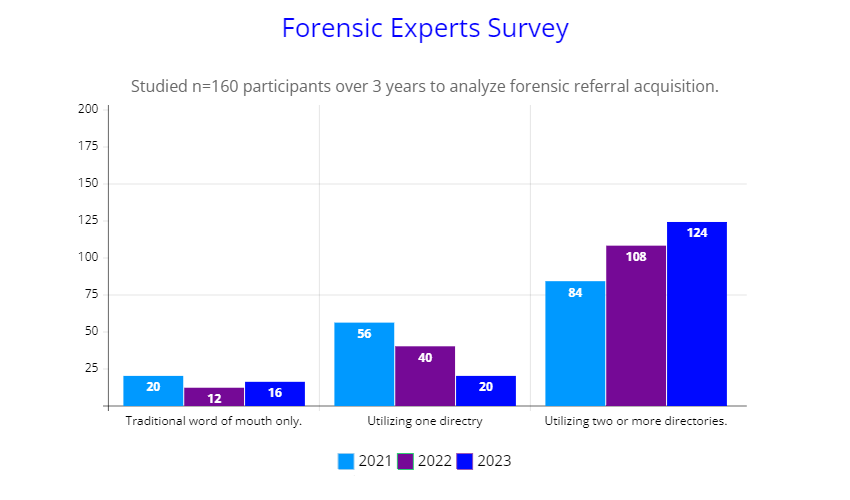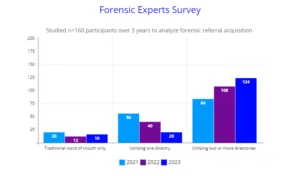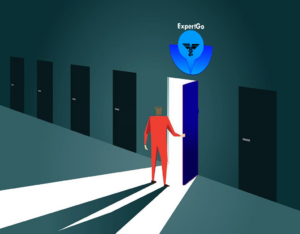An Empirical Investigation of Forensic Referral Acquisition: A Three-Year Longitudinal...
Read More
An Empirical Investigation of Forensic Referral Acquisition: A Three-Year Longitudinal Study with a Randomized Sample (n=160)
- Macro View
-
Aug 24
- Share post

An Empirical Investigation of Forensic Referral Acquisition: A Three-Year Longitudinal Study with a Randomized Sample (n=160)
Abstract: This scientific study aims to explore the mechanisms underlying the acquisition of forensic referrals over a three-year period. A randomized sample of 160 individuals was meticulously tracked on an annual basis to elucidate the processes involved in obtaining referrals for forensic assessments. The primary question addressed by this research is: “What are the strategies employed in obtaining forensic referrals?”
Introduction: Forensic referrals, pivotal in legal and psychological domains, are essential for facilitating objective evaluations of individuals involved in legal proceedings. Despite their significance, the strategies instrumental in acquiring such referrals remain inadequately understood. This study endeavors to bridge this knowledge gap by conducting a comprehensive investigation into the methodologies employed in obtaining forensic referrals.
Methodology: 160 participants, selected through a randomized process, were enrolled in this longitudinal study. The participants were from diverse demographic backgrounds to ensure representation across various sociocultural strata. The data collection spanned three years, with annual assessments conducted for each participant.
Results:
The findings of the study provide a comprehensive view of the strategies employed by experts in acquiring forensic referrals over a three-year period. The data, collected annually for the years 2021, 2022, and 2023, underscore the evolving dynamics of referral acquisition within the forensic domain.

Referral Strategies in 2021: In the initial year, 2021, out of the total 160 experts, 20 experts (12.5% of the sample) relied solely on word of mouth to acquire referrals. This approach highlights the enduring significance of interpersonal networks in the field. Notably, a larger proportion of experts, 56 out of 160 (35% of the sample), exclusively utilized a single directory listing to obtain referrals. This method emphasizes the relevance of centralized platforms for connecting experts with potential clients. Intriguingly, the majority of experts, constituting 84 out of 160 (52.5% of the sample), diversified their approach by utilizing two or more directory listings. This multifaceted strategy points to the recognition among experts of the benefits derived from wider visibility across various referral channels.
Shifts in Referral Strategies in 2022: The subsequent year, 2022, witnessed notable shifts in the strategies employed by experts for acquiring referrals. The reliance on word of mouth decreased, with only 12 experts (7.5% of the sample) employing this method. This decline could reflect a growing awareness of the potential advantages offered by online platforms and directories. Similarly, the number of experts relying solely on one directory listing also decreased to 40 out of 160 (25% of the sample). This reduction suggests a nuanced shift in experts’ perception of the efficacy of single-directory approaches.
In contrast, the strategy of utilizing two or more directory listings gained prominence in 2022. A significant increase was observed, with 108 experts out of 160 (67.5% of the sample) adopting this approach. This surge aligns with the broader trend of professionals recognizing the value of diversification in referral acquisition. The data further highlights the pivotal role played by directory listings in expanding experts’ reach and accessibility to potential clients.
Dynamic Changes in Referral Strategies in 2023: Continuing the investigation into referral acquisition strategies, the year 2023 displayed further dynamics in the methods employed by experts. As the study progressed into its third year, a nuanced evolution in referral acquisition strategies became apparent.
The employment of word of mouth, which had decreased in 2022, experienced a slight resurgence. In 2023, the number of experts utilizing word of mouth increased to 16 out of 160 (10% of the sample). This resurgence could suggest a persistent reliance on personal networks for referrals despite the growing prominence of digital platforms.
Conversely, the strategy of relying on a single directory listing witnessed a decline in adoption. Only 20 experts out of 160 (12.5% of the sample) chose this approach in 2023. This decrease could be attributed to the expanding recognition of the advantages offered by diversification across multiple referral channels.
Remarkably, the trend of utilizing two or more directory listings continued to gain traction. In 2023, a substantial increase was observed, with 124 experts out of 160 (77.5% of the sample) embracing this approach. This upswing underscores the sustained acknowledgement among experts of the benefits derived from wider visibility and accessibility through diverse digital platforms.
Discussion and Implications: The evolving patterns across the three-year period underscore the intricate interplay between traditional and modern referral strategies within the forensic domain. The increase in word of mouth referrals in 2023 suggests the enduring influence of personal networks, even in an era dominated by digital connectivity. This phenomenon might be driven by the trust and familiarity associated with interpersonal recommendations.
The downward trend in relying on a single directory listing, coupled with the consistent rise in the utilization of multiple directory listings, reflects an ongoing shift towards a diversified approach. This shift aligns with broader trends in various professional fields, emphasizing the importance of maximizing exposure and accessibility through diverse online platforms.
The cumulative results of the three-year study highlight the adaptability of experts in response to changing referral acquisition landscapes. The interplay between word of mouth referrals and digital strategies, as well as the shifting preference for diverse directory listings, provides valuable insights into the complex decision-making processes experts engage in while seeking referrals.
Conclusion: The longitudinal analysis of referral acquisition strategies across the years 2021 to 2023 underscores the dynamic nature of the forensic domain’s referral landscape.
The culmination of this comprehensive study reveals a notable and consistent trend over the observed years. It is evident that there has been a discernible growth in forensic experts turning to directory utilization as an instrumental strategy. The data underscores that this approach is not merely a passive response to technological advancements, but a deliberate choice informed by its demonstrable efficacy.
Directory utilization has emerged as a powerful tool for forensic experts, offering them increased visibility and accessibility to potential clients. The continuous rise in the number of experts opting for this approach underscores its capacity to effectively connect professionals with those seeking their specialized services. The transition from relying on singular referral sources to embracing diverse directory listings reflects a strategic decision by forensic experts to optimize their reach and engagement.
.
Growing Your Forensic Practice: Strategies to Attract More Inquiries
Growing Your Forensic Practice: Strategies to Attract More Inquiries As...
Read MoreGetting Started on ExpertGo.
Welcome to ExpertGo’s listing creation process. Follow these simple steps...
Read MoreCase Study: Interview with T. A. Andrews, Ph. D: How ExpertGo Directory Revitalized My Retirement
Dr. Andrews is a revered authority in Biomechanics and Structural...
Read More




